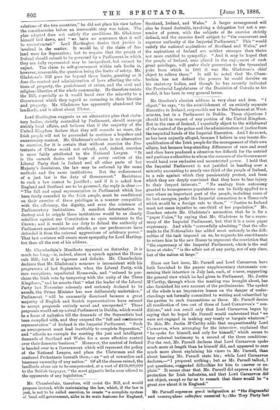Mr. Goschen's election address is very clear and firm. "
I object," he says, " to the establishment of an entirely separate Executive in Ireland, responsible not to the Parliament at West- minster, but to a Parliament in Dublin. These objections I should hold in respect of any portion of the United Kingdom. But in the case of Ireland, I especially object to the withdrawal of the control of the police and the administration of justice from the impartial hands of the Imperial Executive. And I do so not, as has been unjustly alleged, because I believe in any innate dis- qualification of the Irish people for the management of their own affairs, but because long-standing differences of race and creed and class have produced a situation too difficult for the untried and partisan authorities to whom the measure of the Government would hand over exclusive and unrestricted power. I hold that the Imperial Parliament is not justified in banding over a minority amounting to nearly one•third of the people of Ireland, to a rule against which they passionately protest, and from which they are deeply convinced that they have to fear injury to their deepest interests." "No analogy from autonomy granted to homogeneous populations can be fairly applied to a case where an important part of the people, including some of its best energies, prefer the Imperial connection to a Home-rule which would be a foreign role to them." " Justice to Ireland must not mean injustice to one-third of her population." Mr. Goschen retorts Mr. Gladstone's accusation that he is for a "paper Union," by saying that Mr. Gladstone is for a supre- macy of the Imperial Parliament, but that it is a mere paper supremacy. And while "sorrowfully admitting" that the offer made to the Nationalists has added most seriously to the diffi- culties of the task imposed on us, he requests his constituents to return him to the new House to represent the conviction that "the supremacy of the Imperial Parliament, which is the real issue at stake," " is the affair not of any party, nor of any class, but of the nation at large."




































 Previous page
Previous page